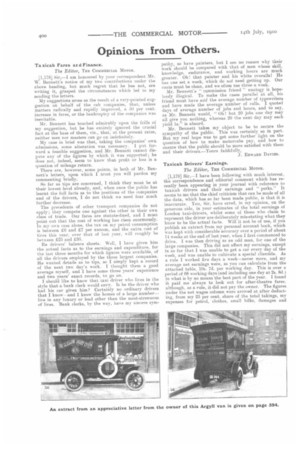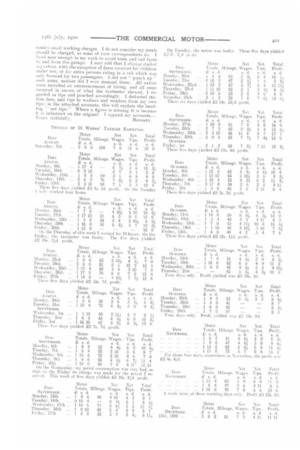Opinions from Others.
Page 16

Page 17

If you've noticed an error in this article please click here to report it so we can fix it.
Taxicab Fares az d Finance.
The Editor, THE CommEnciaL MOTOR.
[1,178] Sir,-1 am honoured by your correspondent Mr. W. Bennett's notice of my two contributions under the above heading, but much regret that he has not, ere writing it, grasped the circumstances which led to my sending the letters.
My suggestions arose as the result of a very-pointed suggestion on behalf of the cab companies, that., unless matters radically and rapidly improved, a 50 per cent. increase in fares, or the bankruptcy of the companies was inevitable.
Mr. Bennett has touched admirably upon the frills of my suggestion, but he has entirely ignored the crucial fact at the base of them, viz., that, at the present rates, neither men nor masters can go on indefinitely.
Mycase in brief was that, taking the companies' own admissions, some alteration was necessary. I put forward a feasible suggestion, and Mr. Bennett cannot dispute any of the figures by which it was supported ; he does not, indeed, seem to know that profit or loss is a question of mileage return.
There are, however, some points, in both of Mr. Bennett's letters, upon which I trust you will pardon my commenting briefly.
So far as tips are concerned, I think they must be at their lowest level already, and, when once the public has learnt the full facts as to the positions of the companies and of the drivers, I do not think we need fear much further decrease.
The precedents of other transport companies do not apply ; they compete one against the other in their own class of trade. Our fares are statute-fixed, and I must point out that the cost of working has risen enormously. In my own case alone, the tax on my petrol consumption is between i!6 and £7 per annum, and the extra cost of tires this year, over that of last year, will roughly be between £25 and £35.
Re drivers' balance sheets. Well, I have given him the actual facts as to the earnings and expenditure, for the last three months for which figures were available, of all the drivers employed by the three largest companies. lie wanted details as to tips, so I simply kept a record of the next two day's work. I thought them a good average myself, and I have some three years' experience and two years' exact records, to go on. I should like to know that taxi driver who lives in the style that a bank clerk would envy. Is he the driver who had his car given him? Certainly no ordinary drivers that I know— and I know the homes of a large number— live in any luxury or lead other than the most-strenuous of lives. Bank clerks, by the way, have my sincere sym pathy, so have painters, but I see no reason why their work should be compared with that of men whose skill, knowledge, endurance, and working hours are much greater. Oh that painter and his white overalls! He has one set a week, which do not need getting up. Our coats must be clean, and we often use three a week. Mr. Bennett's "commission friend" analogy is hopelessly illogical. To make the cases parallel at all, his friend must have sold the average number of typewriters and have made the average number of call. I quoted days of average number of jobs and hours, and to say, as Mr. Bennett would, " Oh! but 20 jobs one day may all give you nothing, whereas 20 the next day may each yield is." is absurd. Mr. Bennett takes my object to be to secure the sympathy of the public. This was certainly so in part. But my real hope was to get some further light on the question of how to make motorcabs pay, and how to ensure that the public should be more satisfied with them and their drivers.—Yours faithfully,
J. EDWARD DAVIES.
Taxicab Drivers' Earnings.
The Editor, THE COMMERCIAL MOTOR.
[1,179] Sir,—I have been following with much interest, the correspondence and editorial comment which has recently been appearing in your journal with reference to taxicab drivers and their earnings and " perks." It seems to me that the chief criticism that can be made of all the data, which has so far been made public, is that it is inaccurate. You, Sir, have erred, in my opinion, on the generous side, in your estimates of the total earnings of London taxi-drivers, whilst some of those who claim to represent the driver are deliberately mis-stating what they know to be the actual facts. Will it not be of use, if you publish an extract from my personal account book, which Was kept with considerable accuracy over a period of about 14 weeks at the end of last year, when I first commenced to drive. I was then driving as an odd man, for one of the large companies. This did not affect my earnings, except in so far that 1 was unable to get a car every day of the week, and was unable to cultivate a special clientele. As a rule I worked five days a week—never more, and my average net earnings were, as you can calculate from the attached table, 10s. 7d. per working day. This is over a. period of 68 working days (and including one day at 2s. 8d.) in what is by no means the best part of the year. I found it paid me always to look out for after-theatre fares. although, as a rule, it did not pay the owner. The figures under the net wages column were arrived at after deducting, from my 25 per cent. share of the total takings, my expenses for petrol, clothes, small bilks, damages and sundry small working charges. I do not consider my meals should be charged, as some of yonr correspondents do. I lived near enough to my work to avoid tram and rail fares to and from the garage. I may add that 1 ulways clocked O y extras, with the exception of fares received for children under ten, or for extra persons riding in a. cab which was only licensed for two passengers. 1 did not " punch up " such sums, neither did I ever demand them. All extras were recorded at commencement of hiring, and all sums received in excess of what the taximeter showed, 1 regarded as tips and pouched accordingly. I deducted station fees, and tips to washers and minders from my own tips ; in the attached accounts, this will explain the heading, " net tips." Where a figure is missing it is because it is indistinct on the original. I append my accounts.-
You rs fa ith fully, HON ESTY




















